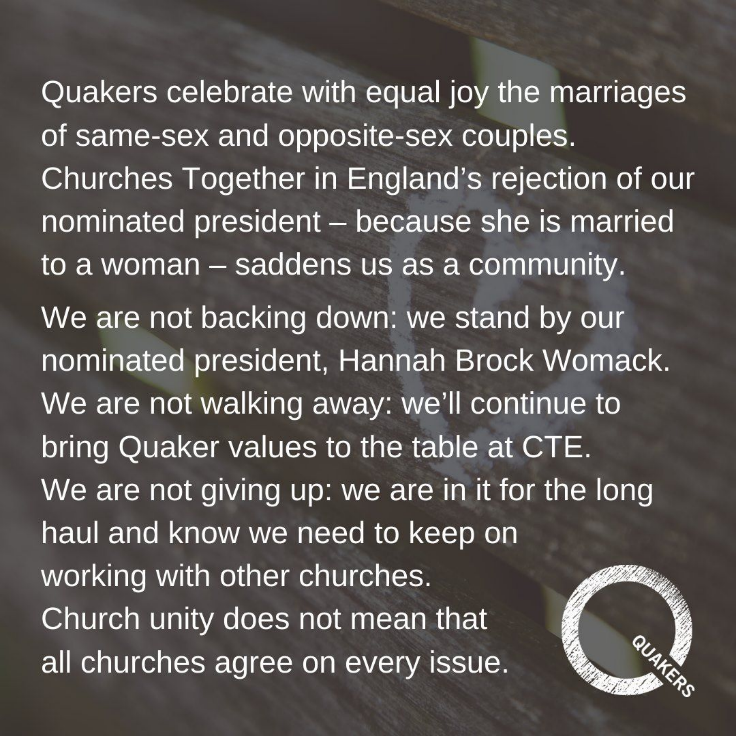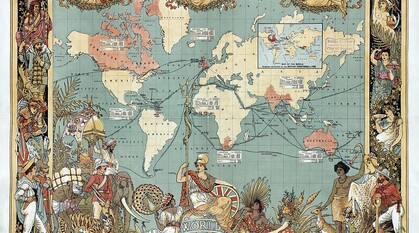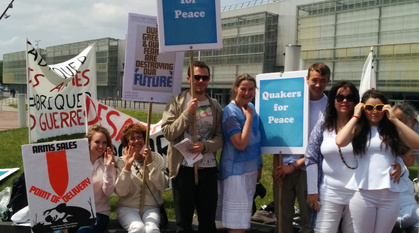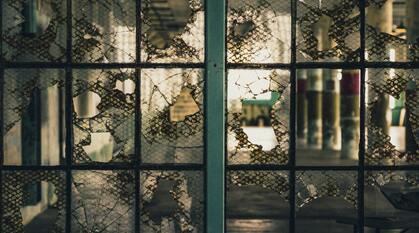Taking my seat again: four years being Churches Together in England's 'Empty Chair' President
Having come to the end of her four-year term as Fourth President, Hannah Brock Womack shares her experience of being prevented from taking up the role for being married to woman.

Four and a half years ago I set up a blog. It was to be called 'Adventures in Ecumenism' and I was planning to explore and share my work as one of the Presidents of Churches Together in England. Sadly, this turned out to be horribly premature: I was not able to take up the role of Fourth President of CTE. Having instead just finished my role as convenor of the Fourth Presidency Group of churches, I'm looking back at that time, what's happened since, and the impacts – both harmful and hopeful – that emerged from that decision.
What is Churches Together in England anyhow?
Churches Together in England (CTE) is the national ecumenical instrument for England. It has 50+ member churches, representing a huge swathe of Christian life in this country, as well as six Presidents from the major traditions of CTE's member churches.
The Fourth Presidency Group¹ (4PG) is the group that Quakers are part of. Every four years, the churches in the 4PG take it in turns to nominate someone from their own church who is then appointed by the group as a whole. In 2019, it was the Quakers' turn.
Being the Fourth President means representing these churches to CTE and helping to represent CTE to the wider world. The role includes attending major national church events, meeting together with the other Presidents, responding to national events (for example by issuing joint statements) and supporting the work of CTE.
Being appointed as a CTE President
Quakers have a process called nominations, in which we try to discern the will of God in working out who should take on a role on our behalf. It often throws up people who wouldn't have put themselves forward for the role in a million years. That's what happened to me: the email from the nominations group came out of the blue, and I still remember sitting on a bus reading the email asking me to consider the role, agog with surprise as phrases like 'ceremonial role…Archbishop of Canterbury…' popped out.
For a long time, I wasn't sure if I was willing or able to accept the nomination. It took a lot of heart-searching to be able to say yes. I had a conversation with a member of the nominations group about the fact that, if this really was such a high-profile role, my activism – including arrestable actions, like blockades – against nuclear weapons and the arms trade might raise eyebrows. I was, naively, more worried about how my conscience-driven civil disobedience might go down in the ecumenical world than about my sexuality. I assumed my upcoming marriage might be uncomfortable for some, but never dreamed it would cause the furore it did.
In the end, I felt led to say yes because I had a feeling that my disquiet with hierarchical religion might be a voice that was needed, rather than a reason to step away. I knew there would be difficult choices to face as I was invited to events, or to be involved in initiatives, that a lesbian, left-wing, pacifist follower of Jesus wouldn't usually have any connection with at all, but I hoped I would be given the words I needed. The fact that I would also be the only woman, only lay person, and only person under 50 among the Presidents also felt important.
The churches within the 4PG do not all affirm same-sex marriage; this isn't something on which we all agree. What they did agree on was that it was the Quakers' turn to nominate a President, and that my relationship or sexuality was not a disqualifier. They also seemed glad to have someone who could offer a different perspective from many of the other Presidents. So, I was nominated by the Quakers, and then appointed by the 4PG on 1 May 2019. I waited with nervous anticipation to start my role.
A spanner in the works
In September 2019, my appointment got onto the agenda of the Enabling Group, which is CTE's representative body, made up of reps from all member churches and related bodies. At the end of the meeting, the Enabling Group issued a statement which included the following: "For the sake of our ecumenical unity as we see it at present, we request that the Fourth Presidency Group show restraint by not exercising the office of their Presidential appointment. We suggest that this be represented by an empty Presidential chair for the current term of office."
This was completely unprecedented. Never before have CTE member churches taken a view on another group's appointed President. It felt to me (and many others) as if the member churches of CTE were making same-sex marriage a litmus test beyond all others, as well as ignoring CTE's own rules for Presidential appointments.
Part of me found it utterly bizarre. Did they want to know my gifts, my experience or my hopes for the role? Apparently not. It seemed they knew enough about me to say that it was impossible for them to allow me to do the job others had prayerfully discerned I could do. I was – amongst other things – angry. Another part of me was not in the least bit surprised. I was brought up in a homophobic (Baptist) church, and this was one of the many reasons I left the church – and the idea of Christianity – in my teens and early twenties, so you could argue I should have seen the opposition coming.
While I was entirely familiar with homophobia in the church, I was less used to it in ecumenical circles where, to quote my friend the author Symon Hill, the 'whole point…is to bring together Christians who strongly disagree on all sorts of issues.' I believed, as many others did, that we were all in this together, and working with individuals and leaders with whom we profoundly disagree was what we signed up for. After all, while some members of CTE despair at our stance on equal marriage, so Quakers deeply regret others' positions on war or women's ministry. Diversity is rather the point!
Responding positively
After the Enabling Group's decision, the 4PG met to work out our response. I didn't know what to expect when I went into that meeting, but it felt beautifully united, Spirit-led and productive – what I had hoped ecumenical work could be. To my surprise, the Group was led to come up with a creative and constructive response. We agreed that if CTE was not going to accept me as a President, we would not appoint someone else and I would not resign. Instead, we would come up with a whole different way of being a presidency group.
We would meet regularly (up until then, the group had usually met only every four years, to officially appoint the next president) and get to know one another better as representatives, and as people. I would facilitate these meetings as convenor of the group. When a statement needed to be signed, we would use consensus decision-making so that all churches in the group were consulted. At CTE events, we asked for "CTE to exercise dedication in ensuring that the empty chair is always physically present and its symbolism understood". In our reply to the Enabling Group, we questioned the whole concept of presidency, now that the "carefully-constructed balance of presidencies which sought to represent the diversity of Christian churches in England has failed", and hoped a wider consultation would take place.
I felt as I have when I've come out of a Meeting for Worship for Business (a Quaker decision-making meeting) – where the answer reached isn't one anyone went into the meeting with, but by listening to each other and to the Spirit, 'way opens'.
Media storm (in a teacup)
What came next was everyone else finding out. This was, to put it mildly, quite weird. I was interviewed on Radio 4's Sunday programme, and in numerous Christian publications, and was on telly multiple times in one day on BBC Look North (I live in Sheffield). My social media accounts had never been so pingy. There was a huge amount of support – from individuals on Twitter, many Quaker meetings around the country, and from whole denominations (the URC and Methodist Church) who put out statements distancing themselves from the Enabling Group's decision. There was a huge amount of anger and shock from folk within and beyond the church.
Understandably, it also made some Quakers wonder what on earth we were doing engaging with this organisation. Some people were of course very happy about the decision, and shocked at our audacity at assuming this appointment would go unchallenged.
Throughout, I felt so thankful that I'd had enough affirming love over my life to feel that it was not an affront to God that I had been appointed – even if it was to some churches. I also knew that whilst the situation was about me, it was also not about me at all. So I was, at a deep level, OK, though day-to-day the situation was draining, difficult and distracting. And I don't want to make light of the situation: I shudder to think how this could've been for another queer person who had experienced more discrimination and for whom this might have felt much more triggering. I was also mindful that I represented a very non-threatening and privileged version of non-heterosexual-ness. I'm white, middle class, cisgender, not very butch, and also young(ish!). While the solidarity that flowed my way felt very genuine, sometimes I felt that someone else might not have been granted the whole 'Hannah seems lovely, how could you reject her?' vibe I was afforded by many Christians and non-Christians alike.
Eventually the rush of attention died down and we were left trying to muddle through an ecumenical landscape which felt deeply divided on this issue.
Being the 'empty chair'
It took a while for the dust to settle but, over the last four years, the 4PG have tried to live up to our commitment to do the presidency differently, and to include me as much as possible. I've convened all 4PG meetings, attended some meetings with the other Presidents as one of two representatives of the Group, and coordinated the Group as we responded to invitations to be involved in CTE initiatives, like statements. In short, I have done the internal work of a CTE President but been excluded from the public-facing role. The 4PG has worked together in a new, collaborative way, and has agreed to keep working together in this way in the future.
For me personally, the last four years have not been totally dominated by this strange course of events, which has been a blessing. Though I didn't know it yet, the media storm around 'the CTE situation' took place in the early days of pregnancy. Nine months later this gave us our daughter Phoebe, who lived for just three days. Bereavement can do many things, but one of the things it did for me for a while was to make everything else seem completely unimportant. For a good few months, I couldn't have cared less about CTE, the churches – any of it. This gradually passed, but I was left with more of a sense of perspective, and gratitude, because in the early days of my grief I received very loving and tender messages from some of the other CTE Presidents. This was a welcome reminder that among the machinations of church politics, we are still humans first.
Where are we now?
Three and a half years after the CTE conference at which I shared in casual conversation that I was going to be married to Annie and all the fuss began, I went to the same conference again and was met with a number of different reactions. Many sought me out to tell me how much they hated the decision. Others, hearing about the decision for the first time, were shocked. And a few – very loud – voices still applauded their own work in making sure I couldn't take up the role. I am distressed by that celebratory attitude when I consider the people (LGBTQ+ and otherwise) who have felt excluded by the reaction towards me. For a number of people, the 'empty chair' incident was the first and last time they heard about CTE. That will take years of healing work to repair.
In May 2023, my term ended. Four years ago, all I hoped was that some good would come out of CTE's very public rejection of me. Writing now, in 2023, I can't say that what happened to me wouldn't happen again. CTE hasn't come nearly far enough for me to have confidence that we will respect each other's appointments – perhaps especially when those appointments are made by smaller churches with less ecumenical clout. Whilst many within CTE's structures have been faithful in ensuring the empty chair was remembered, I've felt that others just wanted to forget the whole thing – to forget me. For the press release to mark the end of my presidency, Quakers asked CTE for a photo they'd taken of the Presidents which included the empty chair. They couldn't, because there wasn't one.
In the Enabling Group's statement about my appointment, they committed themselves to "the continuing journey of consultation, study and deep listening to God and to one another in all areas of our pilgrimage together". To this end, since 2019 I know they have grappled with topics related to their decision, including how to 'disagree well'. Two subsequent meetings of the Enabling Group have been devoted to this, and a new 'Living with Diversity' group within CTE has been set up – though it had very little take up from member churches, and has a very long way to go if we are to ensure that history won't repeat itself. There have also been conversations about the future of the CTE Presidents as a whole – though at the moment these conversations have resulted in sticking with the status quo.
It's been a tough experience. At times hurtful, at times enraging, and often quite dull! It has been infuriating to be typecast solely as someone in a same-sex marriage (joyful and central as that marriage is to my life!), when I felt like I could bring so much more. I wanted to speak up for the radical, grassroots, nonviolent Christian tradition within which I stand. I wanted to see where the Spirit would lead, and what else I could bring to the table. None of this was possible. What happened instead felt like such a waste.
Silver linings
Despite all this, there have been some surprisingly promising fruits which I want to celebrate.
Within the 4PG, we worked together as churches like never before. We now know each other well, as people and increasingly as churches, modelling an ecumenical spirit that I hope has been visible to the rest of CTE. At the end of my term as convener, Dr Anna Krauss, General Secretary of the Council of Lutheran Churches in Great Britain, was appointed as the next Fourth President of CTE. Anna is thoughtful and wise and committed to the joys and trials of working together across denominations. She is committed to ensuring that the last four years are not forgotten, or repeated.
It has also led some Christian groups to 'come out' as LGBTQ+ allies. The shock at the original decision led some folk to speak out publicly for the first time in support of queer Christians being able to take up leadership positions. I've also heard of some groups pulling out of ecumenical bodies. While I'm saddened by this on the one hand (and have not been advocating for Quakers to take this course of action), I can understand the wish to take bold action in response to an oppressive decision, and am heartened by the seriousness with which these groups embrace all parts of the body of Christ.
Perhaps most encouraging, the Pentecostal and Charismatic Forum within CTE has recently engaged in conversations (and held events) on human sexuality. They have started to discuss pastoral care of LGBT people. This feels big. And whilst I have no doubt that we are still a very long way away from tolerance (never mind celebration!) in many churches that are part of CTE, this conversation being held within one part of the membership of CTE is a great step forward, and one that – I've been told – is a direct consequence of the 'empty chair' situation.
There has inevitably also been a big impact on me personally, on my work and activism. As a result of my – entirely unwanted – notoriety, I've encountered some wonderful initiatives by LGBT+ people of faith doing great things to demand safety in the church. I got involved with the Ozanne Foundation's Interreligious Advisory Board, and I'm now a trustee of One Body One Faith, who focus not just on surviving, but on joy. When so many folk are struggling to even exist in hostile settings at present, I'm glad we find time to centre the importance of thriving as well as surviving.
Why I'm sticking around
Whilst I'm not looking to take on another ecumenical role at present (take note, nomination committees!) I've not been put off working with other churches and faith groups for good. Despite the pain we have endured, I hope Quakers can stay within CTE. Ecumenical work is about working with people who we might not agree with but try to love anyway.
Many significant things have happened since 2019, including growing awareness of climate chaos, the power of the movement for Black lives after the 2020 murder of George Floyd, and the Covid pandemic. In these times, CTE and other ecumenical bodies proved very useful – it's much easier to use existing networks when crises hit than to build new ones.
There's a facilitator's saying that "we all have something to learn and to teach". I believe we have a lot to learn from other churches and should bring this humility to certain conversations. In CTE, we are in community with many who are taking racism and racial justice very seriously – recent Quaker Committee for Christian and Interfaith Relations webinars with ecumenical speakers on these topics have been great learning opportunities. Judith Baker's blog post Why are Quakers involved in Churches Together? has more to say on this. We also have something to 'teach', like leading by example in the devotion we bring to embracing our queer members.
I also believe we do good in speaking up for Quaker insights – often marginal in the wider church – in these spaces. Despite my own marginalisation I was able to raise questions around the arms trade, our relationship with the monarchy as people of faith, and the place of LGBTQ+ Christians in the church in meetings with other CTE Presidents. No one else there was going to do so.
I know, and fully respect, those who believe we should not stay in a network that doesn't respect our appointments. And I would not ask anyone else to go through what I have. But I already knew that homophobia was present in many of the churches in CTE – that's partly why I wanted to take up the role. The treatment of LGBTQ+ people in some churches and other places of worship in this country sadly goes far beyond being refused leadership roles, as the testimonies of those involved in the Ban Conversion Therapy coalition attest.
It is to be a vocal queer presence for the people whose faith communities harm them that I want to play a part, and not be pushed out. We also need to avoid complacency around issues of equity and belonging. There is a wide range of opinion among Quakers worldwide on LGBTQ+ rights, and many Quaker meetings in this country still have a long way to go in welcoming trans people (though Quakers in Britain as a whole have stated this as our aim).
Thank you for the support
I want to take this opportunity to say a massive thank you to everyone who has sent messages of support: there have been many of these, from individuals in Quaker meetings and other churches, to whole church congregations. I'm thankful to my family and friends – including of course Annie, who is a tower of love and strength and joy – and to the rest of my family (especially my ever-loving and long-suffering parents) and wonderful friends, who never give me a chance to worry that I am not beloved by God, just as I am.
I'm grateful for the support from all CTE staff (past and present) who have been unfailingly kind; to Quaker staff who support our interfaith and interchurch work; and especially to the rest of the Fourth Presidency Group, who have been nothing but supportive, encouraging and steadfast – whatever their own institution's views on same-sex marriage. It has been a pleasure to serve you. And lastly to my Quaker support group, who have upheld me personally as I sought to walk what has felt like a tightrope at times. You're individually wonderful and collectively outstanding. Thank you.
Finally, I want to say that there is so much work to be done in ensuring churches are places of safety for all, championing marginalised voices rather than silencing them. But we need to start with affirming Christians speaking out and saying so. Otherwise, all those queer people who saw the decision four years ago will continue to see it as more evidence that they are not welcome in the family of God. We have to tell them otherwise – we are not only welcome, we are already here.
Four years ago, I wrote in a Facebook post: "There's a chance, I think, that this might be a tiny part in the cosmic/divine plan to throw open the doors to LGBTQ+ people in all faiths and everywhere. There's also a chance that it's just a muddle we've got ourselves into and we'll need to just go forward in faith hoping that some good might come of it and we might just be able to work together to build a bit more heavenliness on earth." Now, I think it's been a bit of both.



